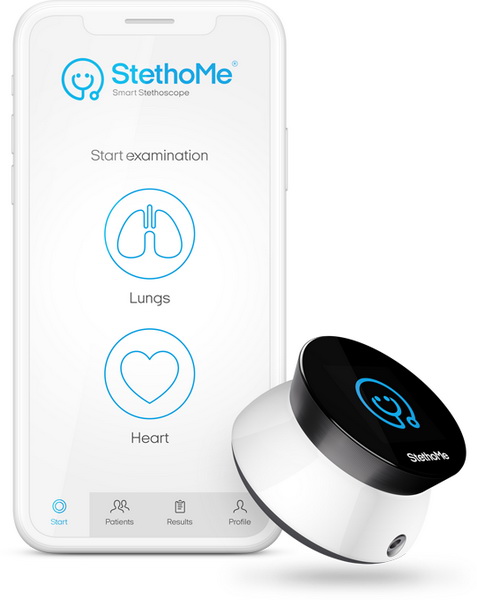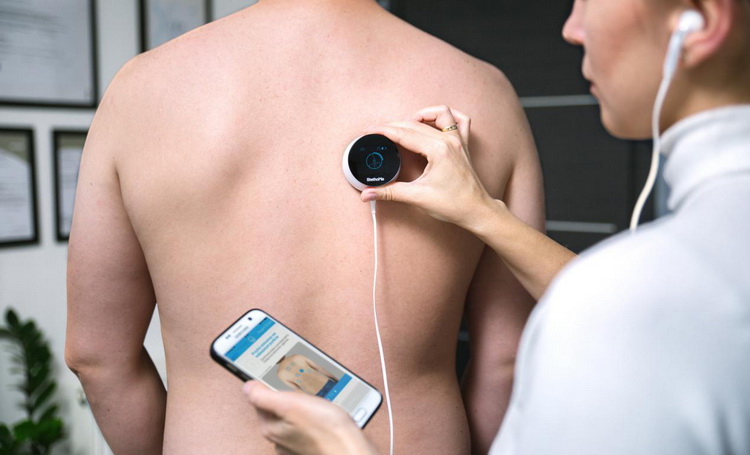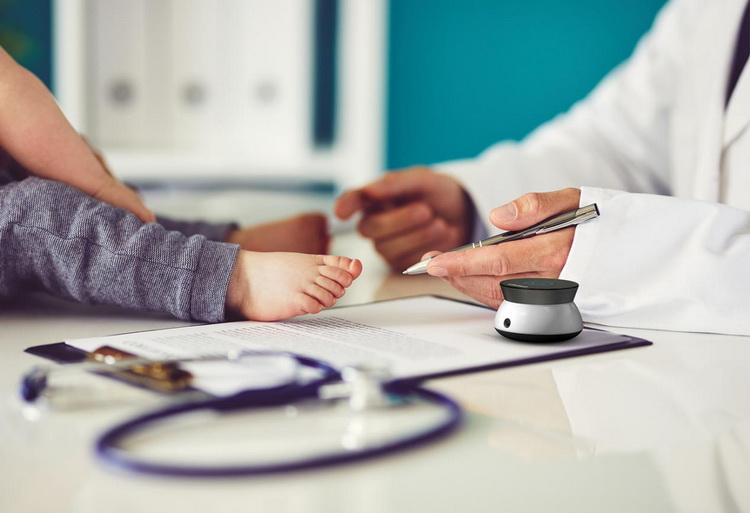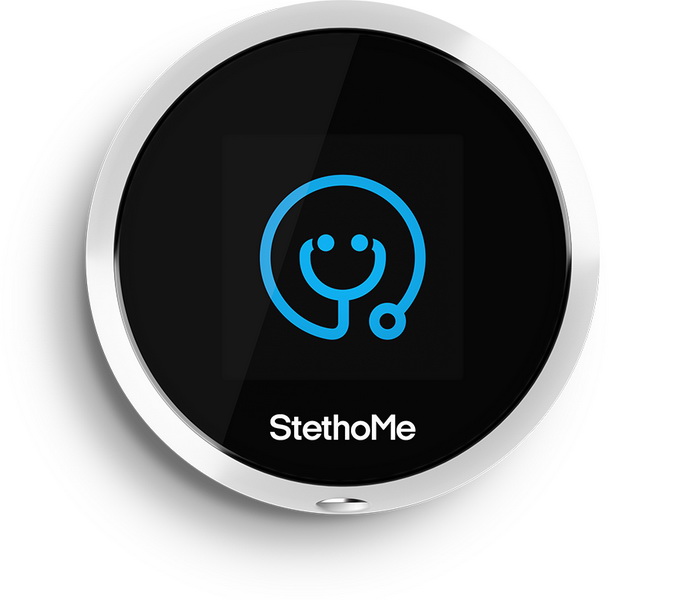
-
StethoMe: Every home should have a smart stethoscope
la mise à jour du temps:2020/5/6
StethoMe: Every home should have a smart stethoscope
Heart disease is the number one killer of global people, respiratory diseases ranked third, and stethoscope auscultation is the most essential and convenient means of pre-diagnosis of heart and lung diseases. Traditional audiology also gradually exposed many problems, traditional audiology mainly relies on doctors' ears and experience, which can easily lead to misdiagnosis. Traditional audiological signals cannot be saved and played back. In remote areas, due to the imbalance of medical resources, there comes the weak diagnostic ability.
StethoMe, an artificial intelligence startup in the healthcare sector, aims to solve these problems. With its groundbreaking smart wireless stethoscope, the startup detects, classifies and analyzes pathological sounds in children's lungs, achieves medical precision level, helps parents to monitor their children's conditions at home.
At the end of 2019, Forbes the leading US business media, listed this startup among the top four tech startups that will”shock” the world in 2020.

"Easy Operation " auscultation, anytime, anywhere
Headquartered in Poznań, Poland, StethoMe's main products are wireless stethoscopes based on artificial intelligence algorithms that are both accurate in monitoring and easy to operate. In 2019, the company's smart wireless stethoscopes and artificial intelligence algorithms were certified by the EU CE as Class I medical devices (CE2274).
In practice, StethoMe provides the easy-to-use, intelligent digital stethoscope, together with the StethoMe AI APP, for intelligent sound analysis, which first tells the user where to place the stethoscope correctly, then collects the audio, decodes the audio results using an AI algorithm, and sends the processed stethoscope audio to a doctor who can gain insight into the patient's breathing.
In addition to listening to the audio, StethoMe provides doctors with professional audio waveforms of patients, enabling them to quickly identify a variety of symptoms, based on visual characteristics. Immediately after that, the doctor can give a reasonable treatment recommendation as to whether the patient needs to be taken to the hospital or remain at home to keep a close watch.

However, from the patient's perspective, individual users don't get symptom information directly, only red and green lights that can show if breathing is normal. Wojciech Radomski, CEO of StethoMe, claims that the diagnosis stays in the hands of the doctor, "We don't want users to Google their symptoms and make blind self-medication, we want them to stay in touch with their doctor to get the right treatment."
The Artificial Intelligence Behind StethoMe
With a smart stethoscope, it is essential to ensure that the transmission to the doctor is an accurate picture of the patient's breathing. Still, many other smart stethoscopes often take in other noises from the patient and the surrounding area. The StethoMe smart stethoscope eliminates different distracting sounds, allowing for more accurate identification of the type of lung disease.
StethoMe's artificial intelligence engine identifies abnormal sounds caused by lung infections, asthma, chronic obstructive pulmonary disease, lower respiratory tract infections and cystic fibrosis.
Artificial intelligence algorithms require the accumulation of massive amounts of data, notes SlawomirKmak, Director of Business Development at StethoMe, their database contains 10,185,866 sound tags, 38,530 medical descriptions and 2,397 cases. Then, World's top pulmonologists, clinicians, physicists and sonographers use artificial intelligence algorithms to screen and analyze these disease data, to cover the World's currently known lung disease conditions, to build a massive and unique heart-lung scanning system.

Team member,also the worried mom/father who care their babies
Hearing is an essential step in a doctor's process to determine the condition for diagnosis, and it is claimed that StethoMe is 29% more accurate than the average pulmonologist in detecting lung infections.
A US study showed that only 25% of family physicians were able to correctly identify the acoustic features of pneumonia after listening with a traditional stethoscope. In the European region alone, 80% of lung sounds and heart activity are misdiagnosed and improperly treated.
According to Wojciech Radomski, CEO of StethoMe, the results of traditional stethoscopy depend on the physician's experience and have low consistency, ranging from 20% to 80%, in identifying stethoscopic sounds at the primary diagnostic treatment level. Secondly, there is a high rate of misdiagnosis (delays,misdiagnoses) at the fundamental diagnostic treatment level. Also, due to parental excessive fear of illness, the number of unnecessary visits to hospital is very high, up to 70% high in the United States alone, highly overwhelming the current shortage of medical resources.
"What's unique about SethoMe is that our team members aren't just cold-hearted scientists or inventors; most are mothers or fathers who have experienced taking their children to the doctor regularly. After experiencing firsthand the various problems with the primary diagnosis, we decided to do something to safeguard the child's health better."

Smart Hearing enters home, quite possible
The idea for a smart stethoscope originated with the founding team's Chief Medical Officer Honorata Hafke-Dys and Kociński, scientists at the Adam Mickiewicz University in Poznań, whose children also suffered from respiratory infections. They suggest that almost every household has a thermometer,why the equally great stethoscope is virtually non-existent? Although stethoscopes are a technically challenging means of observation, it is clear that easy operation can be achieved by parents listening to their children's breathing and heartbeat at home through artificial intelligence technology and remote medicine platforms. This kind idea could change the lives of many families around the World.
Meanwhile, Radomski, Elbanowski and Szajek, who have been running IT service delivery companies, are all looking for an exciting new idea in the medical World. So, to create products that can impact the World and change it globally, experts from the fields of medicine, biology, physics, automation, coding, acoustics and industrial design have came together to launch the smart stethoscope, StethoMe.
Co-founder Dr Honorata Hafke-Dys added, "There is no doubt that artificial intelligence technology is more and more important in healthcare, which is the future of the industry, and we are excited to be at the fore-front of this field together with StoreMe. When users combine our product with remote medicine, and through its widespread use around the World, relieving healthcare professionals’ hard work, we believe that we have pioneered a unique solution."
In 2019, StethoMe had published the valid, relevant user data successfully, and received several awards from the scientific and design community,say IF Design Award 2020,Champion Award in Philips Innovation Challenge. StethoMe® is implementing a project co-financed using support from the European Regional Development Fund.

More and more institutions, such as Adam Mickiewicz University, Poznań University of Medical Sciences, Pediatric University Hospital in Lublin, and the Institute of Tuberculosis and Lung Disease in Rabka-Zdrój, show great support to provide more case data so that StethoMe's extensive database will continuously expand.
Next, StethoMe's goal is to collect more lung tone data from adults and seniors, and to accelerate related research and development, making the StethoMe smart stethoscope a must-have healthcare monitoring device for anyone.
Every home should have a smart stethoscope, could StethoMe's dream come true? We wish we could see it early.

- Economie
- Entreprise
- Culture
- Qui sommes -nous
- Que faisons-nous
- Quel est notre attitude
- Partenaire
- la communication
Copyright © 2015 www.reec.top All Rights Reserved